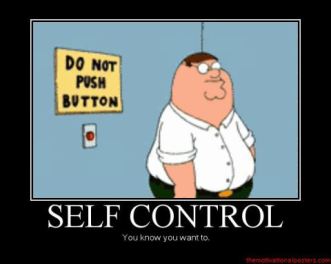As a child did you ever have your mouth washed out with soap because you said a “dirty” word? If so, those are not pleasant memories. Chances are pretty good that if you are reading this, you of an age when that is not going to happen again.
I have been thinking a lot about two dirty words lately. Actually there are three words but one of them is hyphenated. Are you ready? The words are “discipline” and “self-control.” They are not the kind of words that result in a soapy cleaning of the mouth but they are not among the favorite words of most folks.

Jennifer Cohen, says that “Self-discipline is the number one trait needed to accomplish goals, lead a healthy lifestyle, and ultimately be happy.”* While this may be true, discipline is something that most people find easier to impose on someone else than on themselves. It is not easy to exercise restraint over one’s own impulses, emotions, or desires.
I tend to articulate more easily in verbal rather than written form. One of the problems, though, is that I can go on and on trying to make my point if I sense that the hearer is not getting it or if I am having a hard time finding the right expression. I can rightly be accused of often talking a lot and not saying much.
In an attempt to discipline myself I have taken on writing assignments with deadlines. It started with accepting the responsibility of writing a weekly newspaper column. The editor expected me to have it ready by Monday and it was not to exceed 500 words. The timeline pushed me to get it done and the limited space required that I carefully selected my words. In later years my job included a weekly e-newsletter with some of the same limitations. Thoughts for Thursday that you are reading right now is an effort to continue that self-discipline even though it is not a requirement of employment and there is no compensation.
My daughter and son-in-law and another family came from California to visit over the Labor Day holidays. We had a wonderful time and food was at the center of much of our enjoyment. When I weighed myself after they had gone I realized that I needed to get serious about the weight I had been gaining.
I decided to begin a routine of walking several miles daily. Three or four miles in the morning. Three or four miles in the evening. At least 4-5 times a week. In the beginning I was faithful to the commitment I made to myself. Then other things took too much of my time. One day it was raining. It was hot in the evening. Then it turned cool in the morning. There are so many excuses that make it hard to discipline myself to keep up the routine.
Of course, discipline is needed not only to make you do things you would rather not do. It also serves a preventive purpose. It is imperative to exercise self-control to avoid actions or thoughts that are harmful to us or to others. One of the definitions for discipline in the Merriam-Webster Dictionary is “training that corrects, molds, or perfects the mental faculties or moral character.”
John MacArthur asks the question, “Why is discipline important?” Then he provides an answer. “Discipline teaches us to operate by principle rather than desire. Saying no to our impulses (even the ones that are not inherently sinful) puts us in control of our appetites rather than vice versa. It deposes our lust and permits truth, virtue, and integrity to rule our minds instead.”
One of the most famous studies of self-control is known as “the marshmallow test,” which found that children who were able to resist eating one marshmallow—in order to be rewarded with two in the future—later showed higher academic achievement than those who had wolfed the treat down immediately. The study’s results seemed to indicate that self-control is an innate ability with wide-reaching implications for our lives, but later studies have suggested that our self-control actually changes significantly over our lifetime, and can be improved with practice.**

Self-control is a desirable trait for every person and is essential if one is to live an honorable and decent life. I wish that discipline and self-control were the “one and done” kind of experience but I know it is not. It is a lifelong effort. The Apostle Paul includes self-control (self-discipline) as one of the nine fruits of the Spirit (Galatians 5:22) that characterizes followers of Jesus. The good news is that we are not alone in this lifelong exercise. God is present and willing to help us.
Jamie Jenkins
**Psychology Today




 Thomas Edison said, “The three great essentials to achieve anything worth while are: Hard work, Stick-to-itiveness, and Common sense.”
Thomas Edison said, “The three great essentials to achieve anything worth while are: Hard work, Stick-to-itiveness, and Common sense.”